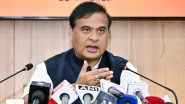United Nations, Jun 2 (PTI) Elections for five non-permanent members of the UN Security Council will be held on June 17, according to the world body's provisional programme.
The programme was released on Monday as France took over the Presidency of the 15-nation Council for the month of June.
According to the informal provisional programme of work of the Security Council for this month, Security Council elections are scheduled for June 17.
India is a candidate for a non-permanent seat from the Asia-Pacific category for the 2021-22 term. Its victory is given since it is the sole candidate vying for the lone seat from the grouping. New Delhi's candidature was unanimously endorsed by the 55-member Asia-Pacific grouping, including China and Pakistan, in June last year.
The General Assembly last week adopted a decision to hold the Security Council elections under new voting arrangements taking into account restrictions in place due to the COVID-19 pandemic.
From India's perspective, any change in how the voting is conducted will not impact much since it is the sole candidate from the Asia Pacific region and its term starts only in January 2021.
The UNSC elections are held in the General Assembly hall with each of the 193 member states casting its vote in a secret ballot. However, large in-person meetings at the world body's headquarters stand postponed due to the COVID-19 pandemic till end of June.
Under the new voting arrangement, President of the General Assembly Tijjani Muhammad-Bande will circulate a letter to all Member States at least 10 working days prior to the first round of secret balloting for the elections, informing them of the date on which the elections will be held, the number of vacant seats, the venue where ballots may be cast and other logistical details.
On the day of the elections, the voter will be required to visit the designated venue during a specific time slot to cast its ballots. Only ballots cast in the ballot boxes at the designated venue will be accepted and no ballots would be accepted after the last time slot has expired.
If the total number of ballot papers cast in all the ballot boxes do not amount to at least a majority of the members of the Assembly, the President would circulate a letter to all Member States indicating a new date and time for the elections. The General Assembly President will circulate a letter to all Member States informing them of the results once the voting is complete and the ballots counted.
Canada, Ireland and Norway are vying for two seats in the Western Europe and Other countries category, Mexico is the only candidate for the one Latin America and Caribbean seat and Kenya and Djibouti will contest the seat available for the African group.
Previously, India has been elected as a non-permanent member of the Council for the years 1950—1951, 1967—1968, 1972—1973, 1977—1978, 1984—1985, 1991—1992 and most recently in 2011—2012.
India has been at the forefront of the years-long efforts to reform the Security Council saying it rightly deserves a place as a permanent member of the Council, which in its current form does not represent the geo-political realities of the 21st Century.
Each year the General Assembly elects five non-permanent members (out of 10 in total) for a two-year term. The 10 non-permanent seats are distributed on a regional basis - five for African and Asian States; one for Eastern European States; two for the Latin American and Caribbean States; and two for Western European and other States.
(The above story is verified and authored by Press Trust of India (PTI) staff. PTI, India’s premier news agency, employs more than 400 journalists and 500 stringers to cover almost every district and small town in India.. The views appearing in the above post do not reflect the opinions of LatestLY)













 Quickly
Quickly


